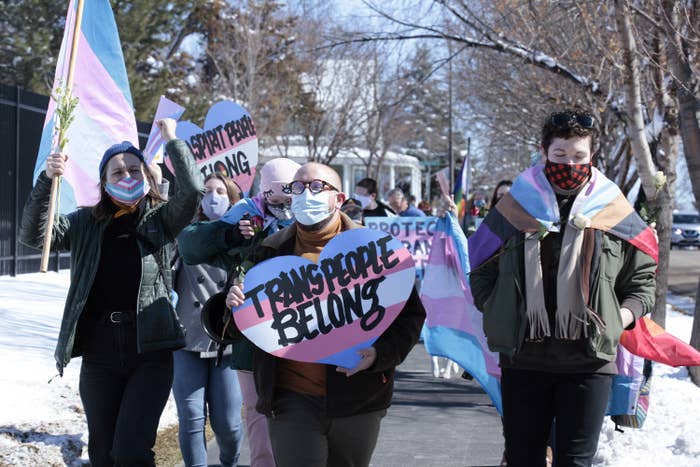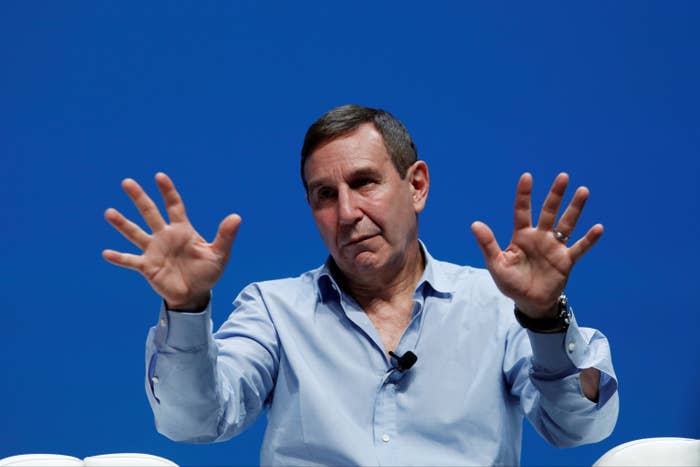NUTTER RIGHTWING POLITICIANS
NOT JUST IN ALBERTA
NB MLA defends attending rally held in opposition to COVID-19 restrictions
WATCH HER BACKPEDAL
Jacques Poitras CBC
3/16/2021


© Jacques Poitras/CBC Miramichi MLA and People's Alliance member Michelle Conroy is defending her decision to attend a rally organized by a group that has promoted anti-mask and anti-vaccine views online.
A People's Alliance MLA is defending her decision to attend a weekend rally organized by a group that promotes anti-mask, anti-vaccine and anti-lockdown views.
Michelle Conroy said she was at the Miramichi rally to support rotational workers who face what she considers onerous self-isolation requirements when they come home to New Brunswick.
"This was just a rally for rotational workers," said Conroy, who has raised the issue at the legislature.
"This was not anti-mask. They told me that as soon as I arrived, that it wasn't anti-mask, anti-lockdown. It was just rotational workers wanting to see their families and being able to do something that's going to help mentally through this time. …
"That's the only thing that this was about."
A Facebook user named Wendy Yehia, who is an administrator of a group called Miramichi Freedom Warriors, posted the photo of Conroy and said the MLA was there "to give us her support."
The Miramichi Freedom Warriors page includes posts questioning COVID-19 vaccines and claiming lockdowns, masking requirements and even hand sanitizers violate the Charter of Rights and Freedoms.
In a video posted from the rally, one man argued that "thousands of doctors and thousands of medical professionals" believe that pandemic lockdowns are "killing more people than they're saving."
Another woman talked at length about "experimental vaccines" and about the federal Emergencies Act, which has not been invoked during the pandemic.
New Brunswick's COVID-19 restrictions are authorized under the provincial Emergency Measures Act.
Education Minister Dominic Cardy said Conroy would have to answer for her presence at the rally.
"I would not go near those sort of rallies with a 10-foot pole," said Cardy, who clashed with anti-vaccination groups when trying to win passage of a bill on mandatory vaccinations for school children.
© Ed Hunter/CBC PC MLA and Education Minister Dominic Cardy has questions about Conroy's decision to attend the rally.
Cardy said the rallies are being organized by Vaccine Choice Canada, who fought his bill and who he called "one of the most dangerous organizations around, spreading misinformation around vaccines."
Yehia said in a post to the group promoting the rally ahead of time that it was "not an anti-mask, anti-vac 'let's all spread covid' type of rally."
Yehia said Monday she was unable to do an interview before the deadline for this story. Another administrator of the Facebook group did not respond to messages from CBC News seeking comment.
People who travel into and out of New Brunswick on rotating work shifts must self-isolate for 14 days when they return, including from their own families.
Public Health rules say that if the worker can't isolate from the rest of the family, then the entire family must self-isolate.
"Right now they can't even leave the house," Conroy said. "They can't go for a walk. They can't sit outside on their doorstep, check their mail, go for a drive."
On Friday the province announced that rotational workers will be eligible for a first dose of COVID-19 vaccine later this month. Officials said it was too early to say whether that would allow the relaxing of the isolation requirements.
"They were hoping to hear better news than they were given," Conroy said.
The second-term Alliance MLA said she has been told of cases of rotational workers bringing the virus back into New Brunswick and infecting others, though she wouldn't say who told her that.
But she said the province's refusal to confirm that it's happened is sowing doubts among the rotational workers themselves about the merits of the policy.
"That's why they want numbers. That's why we've asked for numbers," she said. "They won't tell them if there was any, and if there was any, how many that have brought the virus back."
A photo posted by Yehia shows Conroy, unmasked, talking to someone near the rally location. Masks are not required outdoors in the yellow phase of COVID-19 restrictions unless distancing can't be maintained.
Conroy said she was at the rally for "the better part of an hour" to show her support, and the plight of rotational workers "was the only issue."
Asked about signs saying "End the lockdown" in one of the rally videos, she speculated that it was referring to the restrictions on rotational workers rather than COVID-19 restrictions in general. "I didn't see that sign particularly," she said.
In one recent post to the Miramichi Freedom Warriors page, Miramichi resident Rory Lamkey said the page was the best way to reach "non maskers" and suggested, without any evidence, that recent COVID-19 cases were among people wearing masks.
Yehia agreed the situation was "fishy" and said, without any proof, that it was part of a plan to keep the public in fear to "push" vaccines.




















 Members of the Retail, Wholesale and Department Store Union distributed literature outside the Alabama warehouse where Amazon workers are voting on whether to join the union.Credit...Bob Miller for The New York Times
Members of the Retail, Wholesale and Department Store Union distributed literature outside the Alabama warehouse where Amazon workers are voting on whether to join the union.Credit...Bob Miller for The New York Times
 Amazon’s “inSTALLments” program used postings in warehouse bathrooms to communicate with workers.Credit...The New York Times
Amazon’s “inSTALLments” program used postings in warehouse bathrooms to communicate with workers.Credit...The New York Times


